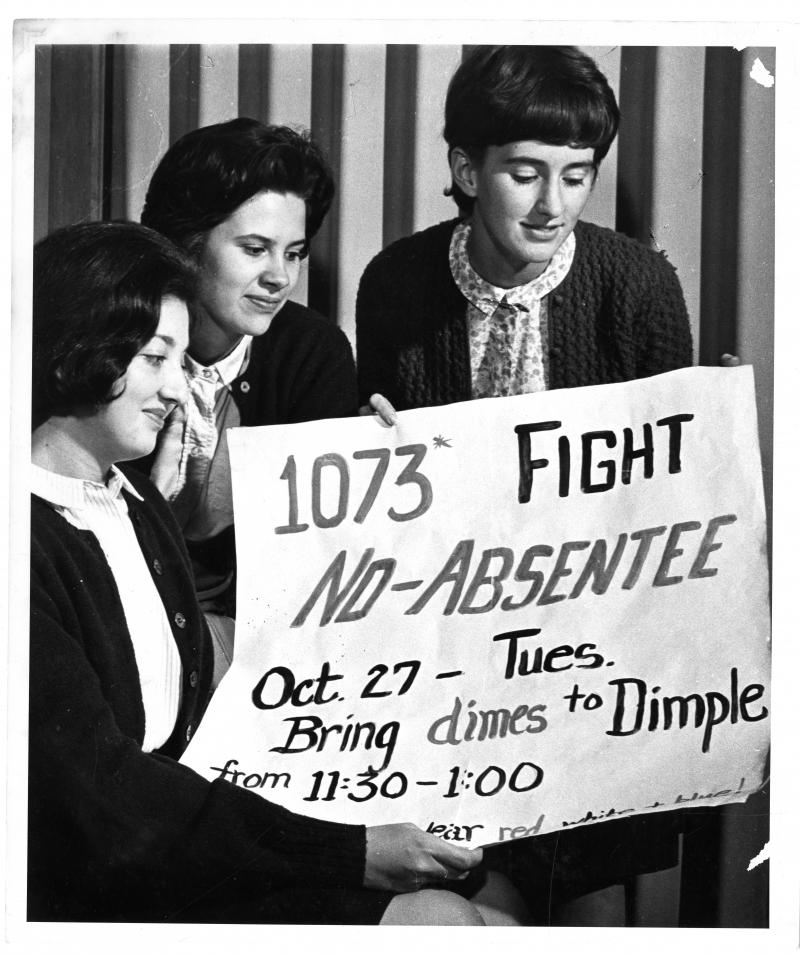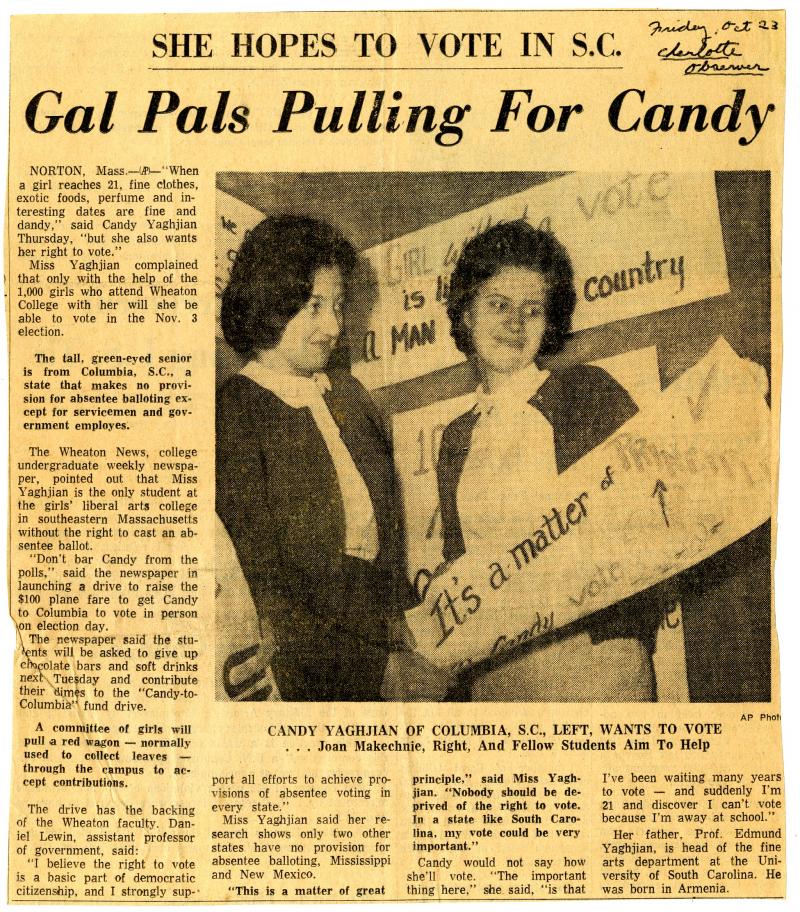One vote's lasting power
Originally published October 3, 2008 on WheatonCollege.edu
Get-out-the-vote campaigns often make the point that every vote counts, which is true of course. Sometimes, however, the impact of a single vote goes well beyond one more ballot in the final tally; sometimes, one vote is enough to secure the rights of civic participation for thousands of disenfranchised citizens.
Just ask Candy Yaghjian Waites '65. College students across the country are expected to play a major role in this year's presidential election. Forty-four years ago, Candy and a group of her friends and classmates helped draw attention to the ways in which some college students were left without a voice, and their efforts helped to change the law in at least one state.

In the fall of 1964, Lyndon B. Johnson was running as the Democratic nominee against Arizona Republican Barry Goldwater. Johnson had ascended to the presidency less than a year earlier following the assassination of President John F. Kennedy.
Candy Yaghjian was a senior at Wheaton College, old enough to vote but too far from her home in Columbia, South Carolina to get to the polls. And at that time, South Carolina was one of three states that issued absentee ballots only to military personnel. College students need not apply. (Today, college students can vote by absentee ballots in all states; information is available online from Wheaton's 1Vote web site.)
"My mother was a community activist and my father was head of the art department at the University of South Carolina," Waites says. "My mother was involved in the League of Women Voters and I grew up knowing that you were supposed to vote when the opportunity came." But the $100 plane fare to go home was beyond her budget.
Waites recalls telling her friends Bonnie Page Downing '65, Joan Makechnie Diver '65, Susan Taylor Smith, Sylvia Brewer Impert '65 and Catherine Newman Kornyei about her predicament while bicycling back from a nearby ice cream stand. They were horrified. In a flash, they hatched a plan to publicize the problem to raise the $100 for Candy's plane fare from their fellow Wheaton students and from any members of the public who felt like chipping in.
"One of our slogans was 'Give up a Coke for Candy!'," she says, noting that soft drinks cost a dime at the time and that collecting ten cents from every student at the college would have yielded just enough for a plane ticket from Boston to Columbia. The group decided on a day of action and demonstration, which the Wheaton College Bulletin described as follows:
"On Oct. 26, the total college enrollment of 1073 [students], wearing red, white and blue, brought dimes to the Dimple to pay Candy's way home to vote.... A delegate from the Norton Post of the American Legion came to campus with a cannon to signal the start of the demonstration; area residents circled the quadrangle in old cars to protest the antiquity of South Carolina's voting restrictions and a Norton fire engine stood by as Wheaton set South Carolina's customs on fire."

The public protest brought a full press entourage: newspaper and wire service reporters, television crews and network announcers and radio journalists. "It must have been a slow news day," she says now. The story was published and broadcast across the country and before long the students had raised far more than the $100 needed to fly home.
The Wheaton students bought one round-trip ticket to South Carolina and donated the rest to the state's League of Women Voters to help encourage other college students to contact their representatives about having the right to vote absentee.
A crowd greeted Waites at the airport and newspaper reporters accompanied her to the polling station where she cast her vote. The publicity galvanized South Carolina's elected officials.
"That spring, I went home and paid a visit to the South Carolina legislature. They had introduced a bill that would broaden the right to an absentee ballot beyond members of the military," Waites says. "It didn't pass right away; I think it took them another year before it finally became the law."
The college's archives contain the copy of a telegram that Waites sent to the campus in May, 1965, informing students and faculty that South Carolina had changed the law so that college students could vote by absentee ballot.
The impact of Waites' campaign has continued on in unexpected ways. "In a way, that was the beginning of my political career, although I had no idea of that at the time. I was [an] English major," says Waites, who served on the (Columbia) County's governing body in the 70s and then served three terms as a South Carolina state legislator.
Today, she is the director of leadership programs the Women's Leadership Institute at Columbia College in Columbia and she teaches a course on the impact of women in South Carolina's political system and society.
"Periodically, someone will remember what happened to me in college and ask me to tell the story again, usually around election time," Waites says. "I always tell people that it just shows what one person can do, when you have the support of others as (the way) I did. Never underestimate the effect you can have."
Candy Waites is the president of Seniors on the Move in Columbia, S.C. Her life's work includes being a member of Richland County Council and a state representative in the South Carolina General Assembly. Waites is a graduate of Wheaton College (1965) and received Masters in Public Administration from the University of South Carolina (1997).